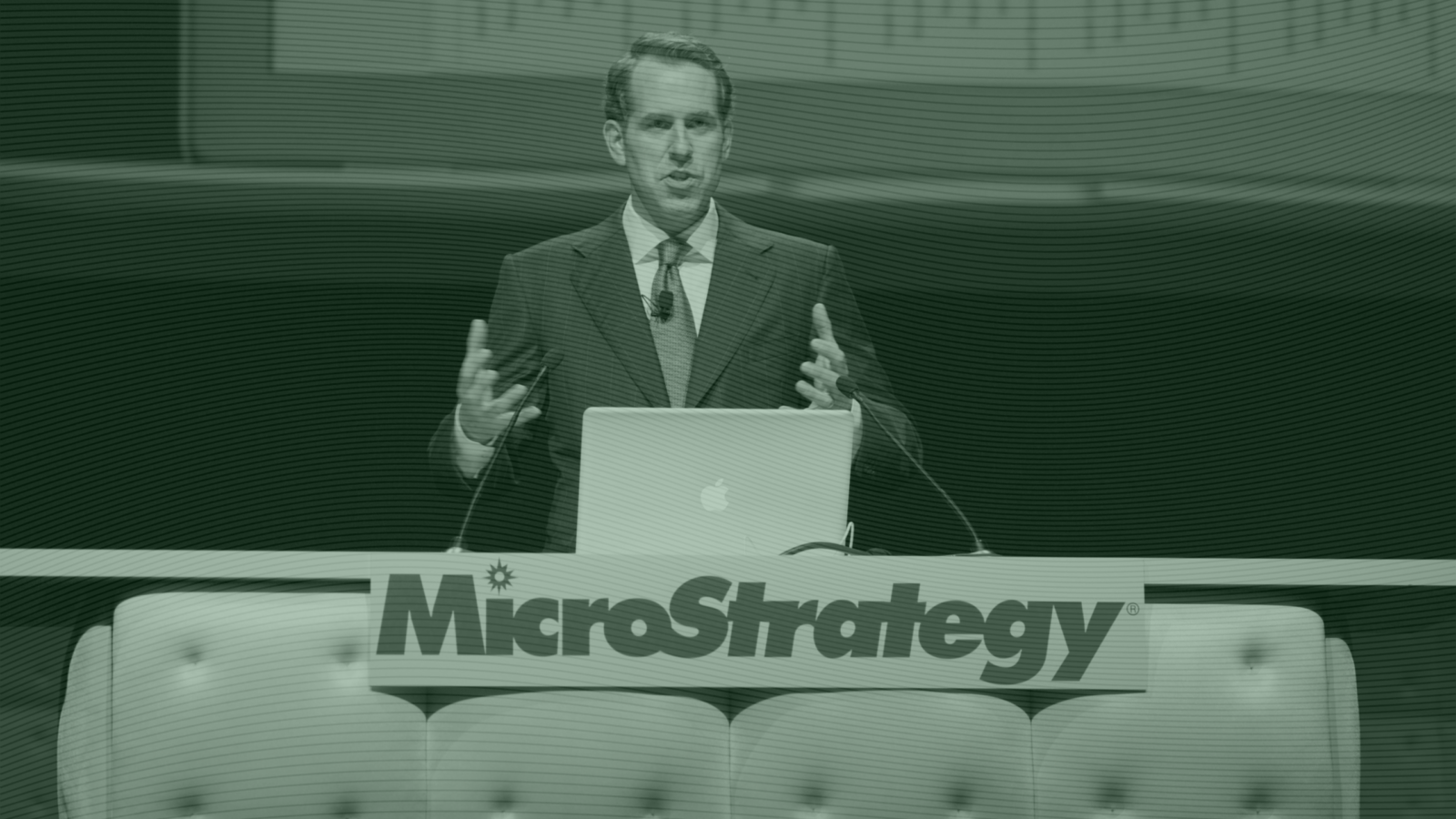Good morning.
Apparently, one of the world’s richest family offices is really into coffee. About a decade ago, JAB Holdings devised a $30 billion strategy to take over household java brands, like Peet’s Coffee, Keurig, and Pret A Manger, and go toe-to-toe with industry giant Nestle, which has customers in 188 countries around the globe. That turned out to be, well, a tall order.
Don’t worry — Germany’s Reimann family is still worth around $25 billion. Unfortunately, it could have doubled that by investing in a plain vanilla fund over the same period, according to a recent Bloomberg analysis. Taking a shot at the most popular instant-coffee maker on the planet turned out to be a pour choice.
This ETF Is the Most Volatile in the US

Ladies and gentlemen, start your engines.
A new exchange-traded fund that tracks a stock closely correlated to Bitcoin has just become the most volatile in the US. The $1.4 billion asset manager Defiance has launched the first leveraged, single-stock ETF that tracks the business software company MicroStrategy, which owns approximately 214,400 Bitcoin with a market value of around $15.22 billion, according to a company release. When Bitcoin advances, MSTX soars.
The massive Bitcoin stake also makes it anything but steady. MicroStrategy now has a 90-day volatility of about 97%, making it the most volatile stock on the market, and trumping other heavily traded names like Tesla (66%) and Nvidia (63%), according to a Bloomberg analysis. For comparison, the tried and true SPY, one of the largest and most heavily-traded funds in the world, clocks in at 14%.
“There should be a strong sense of urgency to check positions daily,” Defiance CEO Sylvia Jablonski told The Daily Upside. “This is a speed boat, not a canoe.”
Defy Gravity
With a targeted daily exposure of 175%, MSTX has quickly become one of the most popular leveraged launches to date. But it’s far from the only leveraged ETF going long or short on an individual equity to have quickly gained steam this year. Some funds have seen scorching returns, including products from GraniteShares and Direxion that are both long Nvidia and up 351% and 292%, respectively, year-to-date, according to VettaFi data. Others, not so much.
“We look at stocks that did not have levered products on them,” Jablonski said. “We were first-movers in a space where there’s innovation and investor appetite.” That hunger is expected to grow, according to industry data:
- There are 191 leveraged exchange-traded products traded in the US, with total assets under management estimated at almost $110 billion.
- The average expense ratio for leveraged ETFs hit 1%, which is handily more costly than traditional passive products.
Disclose This. To be sure, these products are not recommended for long-term use, and usually come with disclosures in big block letters on the prospectus’s first page that discourage investors from holding them longer than 24 to 48 hours. While they’re available to all classes of investors, they often get the most use from day traders, Jablonski said. In other words, they’re not your parents’ index fund — and weren’t designed to be.
“$MSTX saw $22m in volume today, which may be a Day One record for a leveraged ETF,” Bloomberg Intelligence analyst Eric Balchunas wrote in a post on X. “What a country.”
State Street to Tokenize Real-World Assets for Institutional Investors
It’s not just a Silicon Valley fad anymore. Wall Street’s largest and oldest players are coming around on this whole crypto thing, and that could lead to widespread adoption by institutional markets.
State Street — which manages $4.4 trillion in assets and is almost as old as America itself — is partnering with the Swiss crypto firm Taurus to provide tokenization and digital custody services to its clients. The 232-year-old asset manager will utilize the new technology to create and manage tokenized assets and provide access to the blockchain, according to a statement.
It’s the latest example of a traditional financial institution expanding further into the world of decentralized blockchains, and marks another step toward mainstream acceptance.
Building Blocks
State Street isn’t ready for digital custody just yet. The Securities and Exchange Commission has a guideline — SAB 121 — that says unlike other assets, entities safeguarding crypto assets must recognize them and their liabilities on their balance sheets, which means further capital requirements and costs. “As soon as the US regulations help us out, we will be providing digital custody services as well,” State Street’s head of digital asset solutions Donna Milrod told CoinDesk. So now they play the waiting game.
Because tokenized assets are attractive to next-gen clients who might already deal in crypto, and they can be traded outside of market hours, traditional banks and management firms have been increasing their footprints in the new digital landscape:
- In July, Goldman Sachs digital assets global head Mathew McDermott told Fortune that the firm intends to launch three tokenization projects by the end of the year.
- BlackRock unveiled its first tokenized fund issued on a public blockchain in March, called the BlackRock USD Institutional Digital Liquidity Fund, which holds assets in cash, Treasury bills, and repurchase agreements.
- Similarly, in June, State Street Global Advisors announced it was partnering with Galaxy Asset Management to provide investors access to the $2.4 trillion digital asset ecosystem through manager-directed strategies.
Real World, Meet Digital World. Tokenization is when real-world assets like stocks, bonds, real estate, gold, art — really anything you can imagine — are represented as tokens on a blockchain, an immutable ledger controlled by all its users.
Tokenization makes sensitive data more secure and reduces trading costs by eliminating the need for third-party verification. For instance, tokenized transactions bypass the fees typically charged by banks and payment processors, meaning they’re also faster.
“We continue to elevate our digital asset capabilities and deliver the innovative solutions our clients have been seeking,” Milrod said in a statement.
China Wants International Investors Kept in the Dark

If global investors are pulling out of Chinese markets at an alarming rate, Beijing won’t be sounding the bell.
This week, Chinese authorities restricted access to daily data on the Stock Connect platform that shows how much (in this case, how little) foreign money is pouring into the country’s stock market, opting to only release those figures quarterly, the Financial Times reported.
With global investors pulling more than $12 billion out of Chinese securities since the start of June, Beijing doesn’t want that trend to continue. However, its latest coverup tactic may do exactly that, and create the potential for 2024 to be a year of equity outflows for the Middle Kingdom.
Nobody’s Gonna Know
There are plenty of reasons why foreign investors and funds are losing their taste for China. Its economy is slowing as cash-strapped citizens, who are still struggling through the nation’s real estate crisis, are spending less, among other concerns:
- In the second quarter, China’s economy grew 4.7%, its slowest since the first quarter of 2023.
- Rising geopolitical tensions between China and much of the Western world, marred by trade wars and office raids, has many looking for an exit.
- Other markets are also becoming more appealing, especially India, where companies like Apple and Tesla have moved some of their production.
As a result, China’s CSI 300, which tracks the top securities traded on the Shanghai and Shenzhen stock exchanges, has fallen roughly 2% this year. Meanwhile, the S&P 500, Japan’s Nikkei 225, India’s Nifty 50, and Germany’s DAX have all seen their performance increase year-to-date.
They’re Gonna Know: Not releasing data has become China’s modus operandi as of late. Youth unemployment in the Middle Kingdom has gotten so high — pushing 40% in some rural areas — that China just stopped reporting monthly data on it last summer. Around that same time, China asked asset managers and fund houses to stop reporting real-time estimates of their mutual funds’ net value, state-owned newspaper the Securities Times first reported. What’s next? Dog ate the homework.
Extra Upside
- Duran, Duran. Rise Growth Partners, the RIA associated with industry veteran Joe Duran, has taken a big stake in its first RIA partner.
- Tragedy Strikes. Morgan Stanley International chair among six missing after luxury yacht sinks in Sicily.
- Get Rich Quick. A new Charles Schwab survey found a 14% increase from last year in how much money people think it takes to be considered wealthy.
Advisor Upside is edited by Sean Allocca. You can find him on LinkedIn.
Advisor Upside is a publication of The Daily Upside. For any questions or comments, feel free to contact us at advisor@thedailyupside.com.
